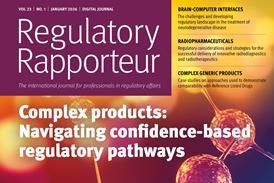HM1: Update on EU new regulatory legislation − EMA, industry and others

Olga Solomon highlighted the Commission proposals in relation to the reform of the EU pharmaceutical legislation, and notably the package adopted by the Commission in April 2023 which includes a new Regulation and a new Directive as well as an initiative aimed at preventing antimicrobial resistance (AMR). She reminded the session audience that the political objectives of this ambitious reform were to improve access to medicines in the EU, strengthen measures to prevent shortages of medicinal products and secure the supply of critical products, while reinforcing affordability for patients and ensuring environmental sustainability. These measures were prepared keeping in mind that they should not negatively impact the capacity of innovation of the pharmaceutical industry and maintain competitiveness.
How to read this journal article
Thank you for visiting Regulatory Rapporteur. Journal articles are restricted to TOPRA members and registered users.
If you are a TOPRA member, or have already registered for limited free access, log in now (Option 1 below).
Not yet a member? You can either join TOPRA (Option 2 below) or register to view limited content for free (Option 3 below).



















